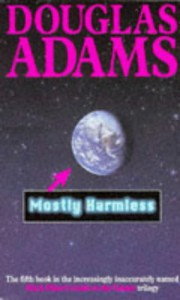Is That It?

I’m not really sure about this book. At first I was going to suggest that it didn’t have any point but then again this is a part of the Hitchhiker’s Guide series, which basically means that the books aren’t going to have a plot, or a point. Well, I guess the lack of a plot, and a point, is a point in and of itself because it simply goes to demonstrate the absurdity of existance, and that is that there really seems to be no point to this whole thing we call reality and in the end we should probably all just go and jump in the sea and go for a swim.
The thing is that this particular book didn’t seem to even explore the absurdity of reality, which, in a way, was the whole purpose of the series anyway – it seemed as if Adams had simply reached a point where he was writing a Hitchhiker’s Guide novel simply for the sake of such a novel, and when he finished it sent it to his publisher and then went around the corner and had a pint at the local pub (most likely English Ale, but then he could have had a Stella, but from my visits to England my impression was that respectable people don’t drink Stella).
So, what can I say about the book – well, it is about Arthur, and Ford, and Trillian, but that is about it. Arthur has lost his one true love due to a freak hyperspace accident, and the one thing that gave him meaning in life – a partner – was suddenly gone. So, he basically travels the universe bored out of his brains, and then settles on a planet to become a sandwich maker, which is basically the only thing he is good at. As for Ford, well, he uncovers a conspiracy at the Hitchhiker’s Guide headquarters, but then heads off to find Arthur only to have his ship stolen by a daughter that Arthur never knew he had, and can’t for the life of him ever remember making her, at least with the mother that is (who happens to be Trillian).
Trillian is the odd thing with the book – is she a journalist or is she an astrophysicist? At first I was a little confused because it seemed as if Adams had completely forgotten what her original profession was, but then it turns out that she got a lucky break, or a not so lucky break as the case may be. Apparently an alternate version of Trillian gave up astrophysics because she missed out on the ride of a life time when she rushed off to get her bag and Zaphod left without her. Then she missed out on another job of a lifetime when she left her bag in her room only to discover that she wasn’t wearing her contact lenses. However, as it comes to light, even if one does get the scoop of a lifetime it doesn’t mean that the newscasters will run with it, especially if they some something much more interesting – we’ve been visited by aliens, well, that’s going to clash with the royal wedding, and the royal wedding is so much more important than aliens that we might as well leave the aliens for another time, maybe a slow news week.
Then again when does news cease to be news – well quite quickly so it happens. If one alien spacecraft lands that is a scoop, but when the next, and the next, and then the next, it ceases to be news and simply becomes part and parcel of everyday life – a politician is corrupt! Hey, all politicians are corrupt so why are we going to run with that story when a baby hippo has just been born in the London Zoo (why is it that, having only spent less than a month out of my entire life in London that I am starting to treat London as if it is my home town? ).
What about the absurdity of life? I find it interesting that this whole concept of absurdity came about when people decided that religion just wasn’t for them – it is as if religion actually gives people a sense of worth and purpose and when you throw that away that sense of worth and purpose suddenly vanishes. Well, not really, because we begin to define ourselves by our possessions, which includes our jobs, our families, and of course our stuff. Yet what happens when all of these things cease to give us pleasure, or even purpose. No wonder the divorce rate is so high because we are measuring our worth by our happiness and when our relationships cease to make us happy we simply discard them. Mind you, the media doesn’t help because they help us define our purpose through the constant bombardment of their propoganda. What if our job doesn’t satisfy, and we aren’t agile enough to get ourselves another job – I guess we are a failure them.
Yet defining ourselves, and defining life and purpose, are huge money spinners. Self help books, universities, and even religious institutions, make bucket loads of money off of people seeking purpose, and sometimes I wonder if they all sit down at their weekly meetings and laugh about our stupidity. Mind you, our purpose could actually be sitting there staring us right in our face yet we would pretty much ignore it because, well, it is too simple and finding out the meaning of our existance couldn’t actually be that easy (or even simply that), so we all wander off back into the misty streets, find the local bar, and return to our beer.
 1
1


